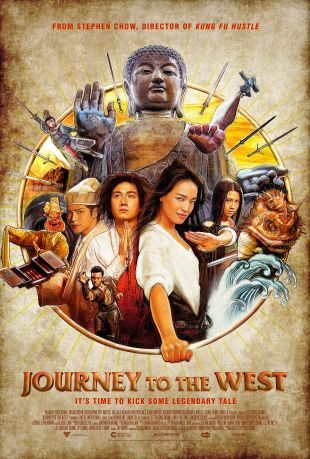
After a five-year hiatus from directing, Hong Kong comedy superstar Stephen Chow returns with Journey to the West: Conquering the Demons, an adaptation of the classic Chinese novel. There's no telling what drew Chow to this project (other than, perhaps, the box-office success guaranteed by a story that's a cultural touchstone in much of Asia), but it's something of an odd fit for him. While his usual trademarks -- CGI-heavy fight sequences and slapstick so broad it barely needs to be translated into English -- are still in evidence, they're a poor fit for a story that's occasionally deadly serious and full of conversations on the nature of Buddhist philosophy. Chow has shown tremendous talent for mixing different genres before, but whereas his Kung Fu Hustle moved seamlessly between comedy, drama, action, musical numbers, and nostalgic references to near-forgotten martial-arts stars, Journey to the West just feels lumpy and disjointed.
The structure of the film is heavily episodic, jumping from one set piece to the next with very little connective tissue in between. The first such sequence involves a water demon (basically a huge fish, rendered by what looks like the best CGI 1997 has to offer) attacking a rural village. Bushy-haired Buddhist monk Xuanzang (Wen Zhang) shows up to save the day, and gets some last-minute help from the beautiful Duan (Shu Qi), a far more experienced demon hunter. There's a brief scene in which Xuanzang laments to his master that he wasn't able to save a small child before subduing the beast, and then we're already off to the next supernatural threat -- a pig demon who kills the guests at a remote inn. Same routine as before: First we see the demon's unsuspecting victims being lured to their deaths; then Xuanzang arrives, out of his depth; finally Duan appears and kicks ass, with Xuanzang providing occasional help and comic relief.

As a result of this stop-start rhythm, it takes a while for Journey to the West to develop any sense of momentum, and even longer for us to figure out what the central conflict of the film is. Also not helping: Comic interludes like Xuanzang being mind-controlled by a woman who's practicing some sensual dance moves, which makes it look like he's doing a striptease for a group of male demon hunters. There are fewer gags in this movie than Chow's previous work, but most of them either fall flat or clash with the tone of the various plot lines.
The romantic subplot between Xuanzang and Duan is problematic as well. Duan is introduced as a fearless heroine worthy of Joss Whedon, but she gradually devolves into someone whose main plot function is to serve as a potential love interest for Xuanzang. She's constantly throwing herself at him and devising new schemes for the two of them to kiss, stating that her affection for him isn't based on looks or charm but his innate goodness -- however, he rejects her advances on the grounds that he's a devout Buddhist who wants to experience the greater love of enlightenment rather than the lesser love of romance (try finding that in an American movie!). That's certainly a will-they-won't-they? dynamic you don't see too often, but the end result is the waste of a potentially interesting character.

Xuanzang's devout Buddhism points to what may be the most appealing aspect of the movie: Unlike 99 percent of Hollywood action flicks these days, the main character of Journey to the West isn't motivated by a desire to get revenge for past wrongs or to prove his worth to a distant father figure or to make a name for himself. Xuanzang simply wants to help others and defeat the demons because it's the right thing to do, and because it's what his religious faith demands of him. Even more incredibly, the movie makes pains to point out that he doesn't want to kill these demons -- all of whom are human beings who were transformed into monsters by their grief -- but to reform them and help end their suffering; Xuanzang even holds true to this philosophy after one of the demons causes him unimaginable personal pain. At a time when even the Star Trek franchise, once a shining beacon of optimism and humanist values, is about cocky heroes battling mass-murdering supervillains to the death (with very little regard for any collateral damage incurred along the way), Journey to the West's compassion is enormously refreshing. It might be a mess, but at least its heart is in the right place.
